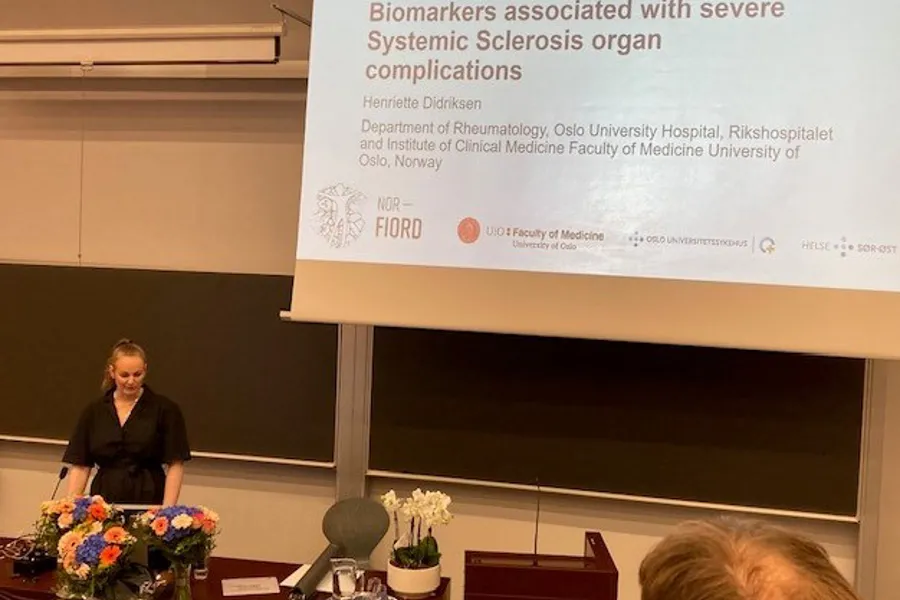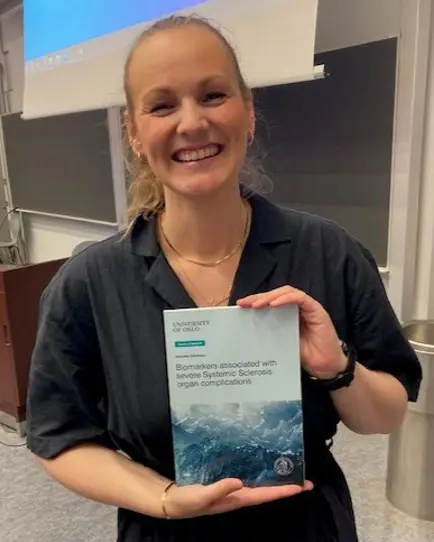Nyhet
Henriette Didriksen disputerte 18. juni 2024
MSc Henriette Didriksen disputerte for ph.d.-graden ved Institutt for klinisk medisin tirsdag 18. juni 2024. Avhandlingens tittel er “Biomarkers associated with severe Systemic Sclerosis organ complications”

Foto: MereteLD, OUS
Disputasen ble gjennomført ved Rikshospitalet der hun forsvarte avhandlingen Biomarkers associated with severe Systemic Sclerosis organ complications.

Foto: MereteLD, OUS
Før dette holdt Didriksen sin prøveforelesning over temaet Molecular mechanisms behind development of autoimmunity in rheumatic disease. Current concepts.
Bedømmelseskomitéen bestod av overlege Kristofer Andréasson, Lund Universitet, Sverige (1. opponent), førsteamanuensis Gro Østli Eilertsen, UiT Noregs arktiske universitet og professor II Hilde Berner Hammer, Universitet i Oslo (leder av komité). Disputasen ble ledet av førsteamanuensis Silje Watterdal Syversen, Universiter i Oslo. Hovedveileder har vært professor Øyvind Molberg, University of Oslo.
Henriette Didriksen gjorde en meget solid innsats. Vi gratulerer henne med vel gjennomført disputas og avlagt ph.d.-grad!
Sammendrag (på engelsk)
Systemic sclerosis (SSc) is a disease leading to fibrosis of skin and organs, vasculopathy and autoimmune features. One of the most common causes of death in SSc in pulmonary arterial hypertension (PAH). Early diagnosis of PAH are crucial, and the need for early detection biomarkers are high. Another serious condition in SSc is affliction of the gastro intestinal tract (GIT). The mechanism behind GIT complications is unclear, and treatment options are limited. A recent pilot study on fecal microbiota transplantation (FMT) in SSc patients indicated effects on lower GIT symptoms, but the mechanisms behind are unknown.
The aim of this study was to identify and investigate biomarkers for PAH and GIT involvement in SSc. We included SSc patients from Oslo, Zurich and Los Angeles, and used immune assays to analyze the levels of the lymphangiogenic factors VEGF-C, Ang-2, their receptors VEGFR3 and Tie-2, and CCL21 in serum samples to investigate their ability as predictive markers for PAH. We also investigated the effect of FMT on inflammatory, fibrotic and lymphaniogenic factors in the duodenum of SSc patients by immunohistochemistry and transcriptome profiling.
We found that serum levels of VEGF-C were lower in SSc compared to healthy controls, and VEGF-C and sVEGFR3 were associated with the development of PAH. Serum levels of CCL21 were higher in SSc patients, especially the once with PAH. In the analysis of the duodenal tissue samples, we found reduced expression of the factors podoplanin and CD64, which correlated with reduced GIT-symptoms. We also found a change in the expression of genes associated with important biological processes after treatment with FMT.
Overall, we identified novel potential biomarkers for the development of PAH in SSc, and showed that FMT may change the expression of genes related to inflammation, fibrosis and lymphaniogenesis in the duodenum. These results gives hope for new diagnostic tools and therapy methods in SSc.